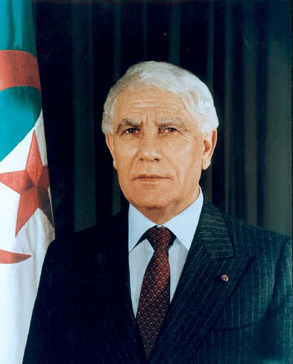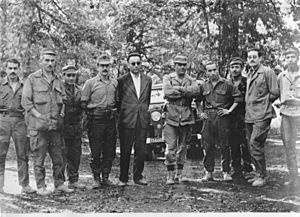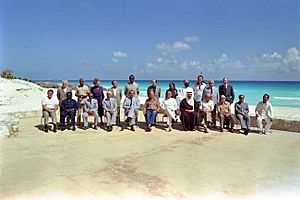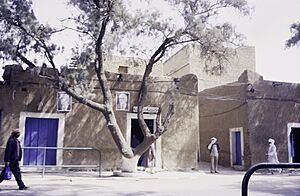Chadli Bendjedid facts for kids
Quick facts for kids
Chadli Bendjedid
الشاذلي بن جديد |
|
|---|---|
 |
|
| 3rd President of Algeria | |
| In office 9 February 1979 – 11 January 1992 |
|
| Prime Minister | Mohamed Ben Ahmed Abdelghani Abdelhamid Brahimi Kasdi Merbah Mouloud Hamrouche Sid Ahmed Ghozali |
| Preceded by | Rabah Bitat (Interim) |
| Succeeded by | Abdelmalek Benhabyles (Acting) |
| Personal details | |
| Born | 14 April 1929 Bouteldja, Algeria |
| Died | 6 October 2012 (aged 83) Algiers, Algeria |
| Political party | FLN |
| Spouse | Halima Ben Aissa |
| Children | 4 |
| Profession | Soldier |
| Military service | |
| Allegiance | Algeria |
| Branch/service | ALN PNP |
| Years of service | 1954–1962 (ALN) 1962–1979 (PNP) |
| Rank | Colonel |
| Battles/wars | Algerian War |
Chadli Bendjedid (Arabic: الشاذلي بن جديد; 14 April 1929 – 6 October 2012) was an important leader in Algeria. He served as the third President of Algeria. His time as president lasted from February 9, 1979, to January 11, 1992.
Before becoming president, he was a soldier. He fought during the Algerian War of Independence. He was also a member of the Revolutionary Council. This was a group that helped lead Algeria after its independence.
Contents
Who Was Chadli Bendjedid?
Early Life and Military Career
Chadli Bendjedid was born in a place called Bouteldja on April 14, 1929. He first served in the French Army. He even fought in a war in Indochina.
But when the Algerian War of Independence began in 1954, he joined the National Liberation Front (FLN). This group fought for Algeria's freedom from France. He was a trusted person to Houari Boumediene, another important Algerian leader.
After Algeria became independent, Bendjedid continued to rise in the military. He became a Colonel in 1969. He was in charge of a big military area from 1964 to 1978. During this time, he helped make sure French soldiers left Algeria. He also watched over the border with Morocco.
Becoming President
From November 1978 to February 1979, Bendjedid was the minister of defense. After President Boumédiènne passed away, Bendjedid became president. He was chosen as a leader that everyone could agree on. This happened after a big meeting of the FLN party in January 1979.
He was elected president in February 1979. He won re-elections two more times without anyone running against him. These elections were in 1984 and 1989.
Changes During His Time as President
As president, Bendjedid made some big changes. He tried to reduce how much the government controlled the economy. He also made it easier for people to live without constant government watch.
In the late 1980s, Algeria's economy faced problems. This was because oil prices, which Algeria relied on, dropped quickly. This caused disagreements within the government. Some leaders supported Bendjedid's economic changes. Others wanted to go back to the old way, where the government controlled more.
In October 1988, young people started protesting. They were unhappy about the government's strict economic rules. These protests grew into large riots in many cities. The military stepped in to stop the unrest. Sadly, many people lost their lives during these events.
After this, Bendjedid decided to move Algeria towards a democracy with many political parties.
Leaving Office
In 1991, there were elections. A group called the Islamist Front Islamique du Salut (FIS) was expected to win. But the military stepped in to stop them from coming to power. This led to Bendjedid being forced out of office in January 1992. His departure started a long and difficult period known as the Algerian Civil War.
Life After Presidency
After leaving office, Chadli Bendjedid was kept under house arrest. This lasted until 1999. He was freed when Abdelaziz Bouteflika became president.
In an interview in 2002, he said he was willing to accept the results of the 1991 election. He believed the constitution gave him the power to work with the FIS. However, he could not get the military to agree with him.
He appeared in public again in 2008. He gave a speech in his hometown. His memories were planned to be published in November 2012.
Illness and Death
Chadli Bendjedid was treated for cancer in Paris in January 2012. He went back to the hospital in May and October 2012. On October 3, 2012, he was admitted to a military hospital in Algiers. State media announced that he died of cancer on October 6, 2012. He was 83 years old. He was buried at the El Alia Cemetery.
Honours
National Honour
See also
 In Spanish: Chadli Bendjedid para niños
In Spanish: Chadli Bendjedid para niños
 | Anna J. Cooper |
 | Mary McLeod Bethune |
 | Lillie Mae Bradford |




